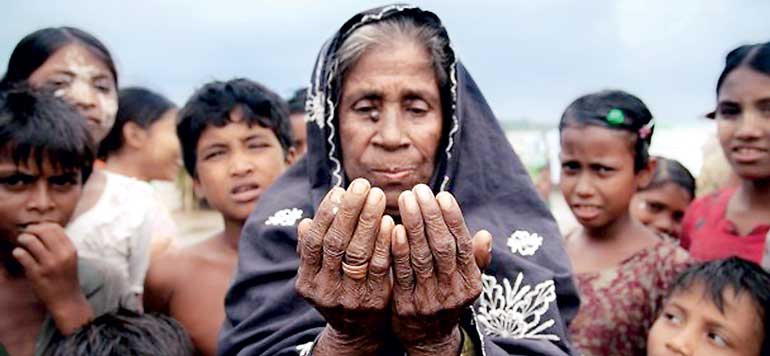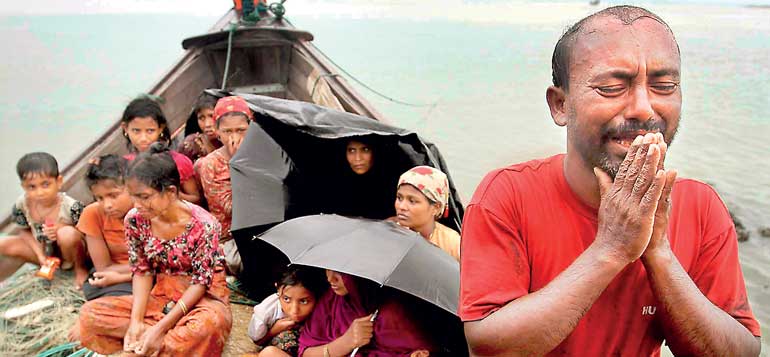Monday Feb 16, 2026
Monday Feb 16, 2026
Tuesday, 12 September 2017 00:00 - - {{hitsCtrl.values.hits}}


According to the Assembly of Rohingya in Bangladesh, over 6,500 people have been killed, 8,400 injured, and 23,000 houses were burned down. The government which is responsible to protect its own citizens is doing nothing in Myanmar
Historical overview
The aim of this article is to explore the plight of Rohingya Muslims and the role of the international community. The Rohingya is one of the most persecuted ethnic minorities in the world, with no protection either from the domestic government (Myanmar) or from the international community.
Rohingya is a small ethnic minority (Muslims) in the majority (Buddhist) country and make up around one million of the total 50 million populations. They hail from the country’s northwest and speak a Bengali dialect. Almost all live in Rakhine/Arakon, one of the poorest (lack of natural resources) states, with a population of three million. Though many of them have been living there for generations they are not considered as citizens by the Myanmar Government. Instead, they are considered to be illegal immigrants from Bangladesh. 
The 1982 Citizenship Law1 denied the citizenship of Rohingya and even the right to live and self-identification. They were effectively banned from voting at the last general election and left without political representation. The Rohingya Muslims are also subjected to many restrictions in their day-to-day life. They are not allowed to travel from one place to another, are prohibited from working outside their villages, cannot marry without permission from the authority, lack livelihood opportunities, have limited medical care and no education, etc. In fact, the Myanmar Government has been trying to eliminate the entire Rohingya Muslims from its own territory.
The history of the Rohingya community in Myanmar goes back to the eighth century as they claim to be original settlers of Rakhine Province, the country, while tracing their ancestry to Arab traders. Bengali Muslims from neighboring Bengal (which then included Bangladesh also) started arriving in Rakhine after King Narameikhla (1430–1434) retained his throne with the help of Sultan of Bengal of that time. Besides, a large number of Bengalis migrated to Rakhine during the British rule (from 1824 to 1948) which encouraged Bengali inhabitants to migrate to fertile valleys of Arakan as agriculturalists.
The British census in 1891 reported that there were around 58,255 Muslims were in Rakhine (Arakan). By 1911, the Muslim population had increased to 178,647. However as of 2012, there were more than 800,000 Rohingyas residing in Myanmar, most of them live in the province of Rakhine. The high influx of Muslim population has created a number of violent incidents between the Rohingya Muslims and the Local/Rakhine people in Myanmar.
Hostility against Rohingya Muslims is not a new phenomenon; the annexation of the independent province of Rakhine in 1784 by the Burmese government came up with discriminatory policies and persecution of Rohingyas. They were marginalised and the Myanmar Government put several restrictions on their movement and their marriage, and constantly confiscated their land and drove them to annihilation. It is said as many as 35,000 Arakanese people fled to the neighbouring Chittagong region of British Bengal in 1799 to avoid Burmese persecution and seek protection from British India. The Burmese rulers executed thousands of Arakanese men and deported a considerable portion of the Arakanese population to central Burma, leaving Arakan as a scarcely-populated area by the time the British occupied it.
During World War II, Japanese forces invaded Burma, then under British colonial rule. The British forces retreated and in the power vacuum left behind, considerable violence erupted. This included communal violence between Buddhist Rakhine people and Muslim Rohingya villagers. The period also witnessed violence between groups loyal to the British and Burmese nationalists. The Rohingyas supported the Allies during the war and opposed the Japanese forces. The Japanese committed atrocities toward thousands of Rohingyas, including rape, torture, and murder. In this period, around 22,000 Rohingya are believed to have crossed the border into Bengal, then part of British India, to escape the violence. Some 40,000 Rohingya eventually fled to Chittagong after repeated massacres by the Burmese and Japanese forces.
In 1947, Rohingya Muslims formed a Mujahid Party which supported jihad movement in northern Arakan. The aim of Mujahid Party was to create a Muslim Autonomous state in Arakan. But after the 1962 coup d’etat by General Ne Win, military operations targeted them over a period of two decades. The prominent one was “Operation King Dragon” which took place in 1978; as a result, many Muslims in the region fled to neighbouring country Bangladesh as refugees. Over 200,000 Rohingyas are said to have fled to Bangladesh following the ‘King Dragon’ operation of the Myanmar army.
Officially this campaign is aimed at “scrutinising each individual living in the state, designating citizens and foreigners in accordance with the law and taking actions against foreigners who have filtered into the country illegally.” This military campaign, in effect, is directly targeted civilians, and resulted in widespread killings, rape and destruction of mosques and further religious persecution.
During 1991-92 a new wave of atrocities forced over a quarter of a million Rohingyas to flee to Bangladesh. They reported widespread forced labour, as well as summary executions, torture, and rape. They said they were forced to work without pay by the Burmese army on infrastructure and economic projects, often under harsh conditions. Many other human rights violations occurred in the context of forced labour of Rohingya civilians by the security forces. The above examples show that how the Rohingya Muslims have been persecuted throughout the history in Myanmar.
The present alarming situation
The recent conflict in Myanmar started in 2012 between the Rohingya Muslims and Rakhine Buddhists. The first and most deadly incident began in June 2012 when widespread rioting and clashes between Rakhine Buddhists and Muslims, largely thought to be Rohingya Muslims, left 200 dead and displaced thousands. It was the rape and murder of a young Buddhist woman which sparked off that deadly chain of events.
In March 2013 an argument in a gold shop in Meiktila in central Myanmar led to violence between Buddhists and Muslims which left more than 40 people dead and entire neighbourhoods razed. In August 2013 rioters burnt Muslim-owned houses and shops in the central town of Kanbalu after police refused to hand over a Muslim man accused of raping a Buddhist woman.
In January 2014, the UN said that more than 40 Rohingya men, women and children were killed in Rakhine state in violence that flared after accusations that Rohingyas killed a Rakhine policeman. In June 2014, two people were killed and five hurt in Mandalay, Myanmar’s second city, following a rumour that spread on social media that a Buddhist woman had been raped by one or more Muslim men.
Apart from the continuous ethnic cleansing, there was a very famous Buddhist monk called Ashin Wirathu and his movement 969 also played a major role to wipe out the Muslims from Myanmar. Ashin Wirathu is a nationalist Burmese Buddhist Monk and the spiritual leader of the anti-Muslim movement in Burma. He led a rally of monks in Mandalay (Second largest city in Myanmar) in September 2012 to promote President Thein Sein’s controversial plan to send Burmese Rohingya Muslims to a third country. One month later, more violence broke out in Rakhine state. Wirathu claims the violence in Rakhine was the spark for the most recent violence in Burma’s central city of Meiktila, where a dispute in a gold shop quickly spread to other areas. However, evidence shows that Ashin Wirathu was behind all these killings and he was supporting the President.
In 2016, some armed individuals attacked police posts in Rakhine State, leaving nine police personnel dead. Weapons and ammunitions were also looted. A newly-formed insurgent group, Harakah al-Yaqin in Arakan, claimed responsibility a week later. Following the police camp incidents, the Myanmar army began a major crackdown in the villages of northern Rakhine state. In the initial operation, dozens of people were killed and many were arrested. As the crackdown continued, the casualties increased.
Arbitrary arrest, extrajudicial killings, gang rapes, brutalities against civilians, and looting were reportedly carried out. According to media reports, hundreds of Rohingya people had been killed by December 2016, and many had fled Myanmar as refugees to take shelter in the nearby areas of Bangladesh and India.
In late November, Human Rights Watch released satellite images which showed that approximately 25,000 Rohingya houses in 50 villages had been burned down by the security forces. The media and the human rights groups frequently reported intense human rights violations by the Myanmar military. During one incident in November, the Myanmar military allegedly used helicopters to shoot and kill the villagers after some villagers joined the insurgents in an ambush which killed a senior army officer. The army confirmed that two helicopters mounted with guns dispersed the crowd but denied they shot at civilians.
As of November 2016, Myanmar had yet to allow the media and human rights groups to enter the persecuted areas. Consequently, the exact figures of civilian casualties remained unknown. The Rakhine State was termed an “information black hole”. The violence in 2017 continues without an end. No one knows the exact number of deaths and destruction.
According to the Assembly of Rohingya in Bangladesh, over 6,500 people have been killed, 8,400 injured, and 23,000 houses were burned down. The above incidents show that the national army in Myanmar which is supposed to maintain the law and order has failed to do so but rather it is killing its own citizens without any mercy. The government which is responsible to protect its own citizens is doing nothing in Myanmar.
Protection of Rohingya Muslims
Regarding the protection of Rohingya Muslims, the domestic government (Myanmar) has the primary responsibility to protect people. Rohingya Muslims have the rights to request their basic needs and to receive protection from the domestic governments.
They shall not be persecuted for making such request. Every human being shall have the right to be protected against being arbitrarily displaced from his or her home of habitual residence. However, it has been found that not all governments fulfil this responsibility in the same manner nor provide equal protection for its people.
Many governments are neglectful in their protection regime some deliberately subject their populations to forcible displacement, starvation, mass killings and other serious human rights violations, while some others do not have the capacity to deal with the problem on their own. In situations where the states are unwilling or unable to protect its own people then the responsibility for protecting those goes to the international community.
In Myanmar the domestic government which has the sole responsibility to protect Rohingya Muslims has failed to protect. But it urges the military to kill the people and forcibly evict them from their homes. In such a situation the international community has to protect those people.
The role of international community
The United Nations has stated that the treatment of the Rohingya is a crime against humanity and has labelled it as ethnic cleansing. Following the United Nation’s report on 3 February denouncing these crimes, Human Rights Watch has also said that the ongoing situation reflects “devastating cruelty”. Other groups such as UNICEF have also denounced Myanmar as the violations of Rohingya children’s rights is “totally unacceptable”. All of these groups have stressed the importance of the government in Myanmar taking action, and a stronger response from the international community.
On 4 February, the UN High Commissioner for Human Rights Zeid Ra’ad Al Hussein said: “The Government of Myanmar must immediately halt these grave human rights violations against its own people, instead of continuing to deny they have occurred, and accept the responsibility to ensure that victims have access to justice, reparations and safety.”
Many have spoken out against the leader of the National League for Democracy and Nobel Peace Laureate, Aung San Suu Kyi for remaining so quiet on the issue and not going into the Rakhine State to try and diffuse tensions. Pearsons, the Australian Human Rights Watch Director, suspects it is for political reasons, as the Rohingya are very unpopular in Myanmar. Though she is not the president of Myanmar, she is considered its de facto leader.
It is reported that around one million Rohingya refugees live outside Myanmar in Bangladesh, India, Malaysia, Pakistan, Sri Lanka, etc. However, their living conditions are very poor in many countries. For example, in Malaysia the Rohingya refugees cannot move from one place to another. In India, the government does not provide them proper food or shelter. Many countries where the Rohingya Muslim lives as refugees do not want to keep them anymore and consider it as a burden to their country. Therefore, they have closed the borders and do not let the refugees to come in.
The West is not at all interested about Rohingya Muslims. Up to now none of the European countries have expressed their concern over the Rohingya Muslims. Only Turkey has conducted a few dialogues with Myanmar and sent its relief mission to Myanmar last week.
Conclusion
The overall conclusion is that the Rohingya Muslim is the only ethnic minority which suffers most in the world now. No protection either from domestic government or from the international community. Even Arab countries do not open their borders for this stateless minority.
Footnotes
Myanmar Nationality Law currently recognises three categories of citizens, namely citizen, associate citizen and naturalised citizen, according to the 1982 Citizenship Law. Citizens are required to obtain a National Registration Card, while non-citizens are given a Foreign Registration Card. Rohingya people are considered as naturalised citizens.